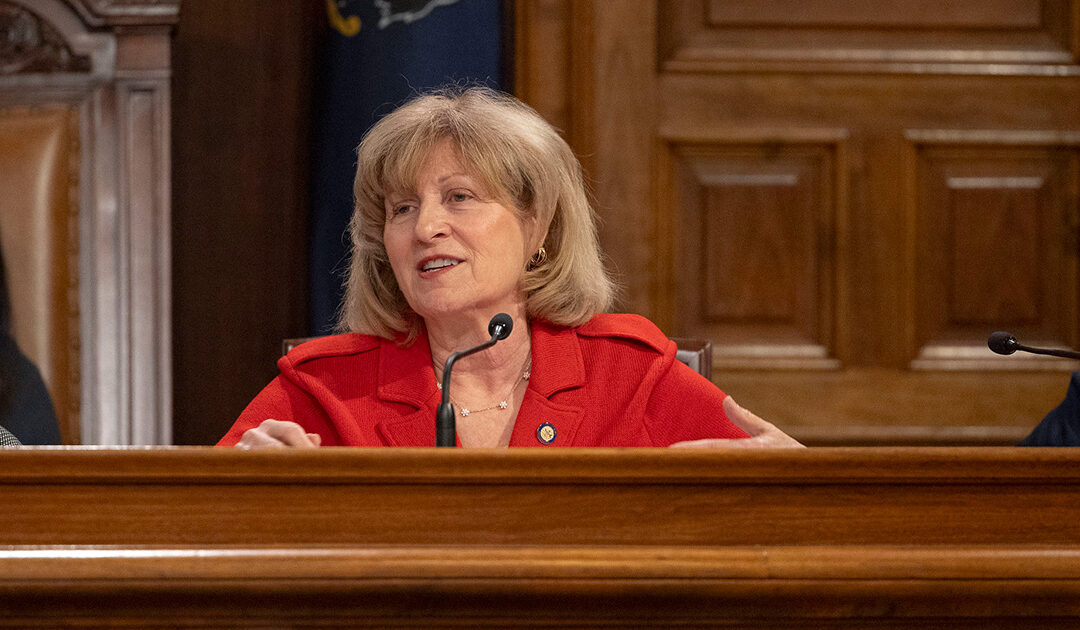Harrisburg, Pa. − December 5, 2024 – Senator Lindsey M. Williams (D-Allegheny) and Senator Judy Schwank (D-Berks) joined the School Nutrition Association of Pennsylvania (SNAPA) today for a Day of Action in support of the Senators’ Universal School Meals legislation. This legislation is aimed at fighting child hunger and helping our students succeed by expanding Pennsylvania’s current Universal Breakfast Program to include lunch.
Every day in Pennsylvania, 1 in 8 kids goes hungry. In rural areas, as many as 1 in 5 kids experiences hunger. When students are hungry, they cannot learn. The Universal School Meals program connects kids to healthy foods every day so they can learn and succeed.
“High prices at the grocery store are hurting everyone, and our families are feeling the pinch,” said Senator Williams. “Expanding Pennsylvania’s Universal Breakfast Program to include lunch for all students ensures that every student is fed and ready to learn every day. It also reduces grocery bills for families, while driving down grocery costs for everyone. This legislation is an incredible win for every Pennsylvanian.”
A Wharton School economist study found that expanding school meals lowers grocery prices. Fewer meals being prepared at home means that fewer groceries are being purchased. This lower demand leads to lower prices. The study found that big chains saw grocery sales decrease by 10% in areas where students receive no-cost meals, which was enough to cut prices 2.5% at store locations throughout the entire region, not just at stores within the school district. Residents across Pennsylvania will see the benefits of lower grocery prices as a result of Universal School Meals.
“Students deserve access to the nutritious foods they need to be productive in the classroom and lead healthy lives,” said Senator Schwank. “We took a tremendous step in 2023 by making breakfast free for Pennsylvania students, but we shouldn’t stop there. Expanding access to include lunch will ensure our kids don’t go hungry and will put more locally grown, healthy products on their lunch trays.”
Expanding the Universal School Meals Program to include no-cost lunch supports local farmers and creates jobs by enabling their farms to provide more food to schools. 44% of Pennsylvania schools already participate in the PA Farm to School network, which provides students with opportunities to learn about food, agriculture, health, and nutrition, while giving farmers the opportunity to sell their products directly to school districts. This expansion will allow more farms and schools to participate the PA Farm to School network, benefitting both our family farmers and our students.
“The School Nutrition Association of Pennsylvania proudly supports Senator Williams’ and Senator Schwank’s reintroduction of legislation to provide school meals for all students. Ensuring every child has access to nutritious meals not only promotes better academic performance and health outcomes but also eliminates stigma and barriers that prevent students from thriving. We believe this legislation is a critical step toward fostering equity and success for all Pennsylvania students, ” said Melissa Froehlich Green, Public Communications Chair of the SNAPA.
Students benefit when they eat local, nutritious food. School meals reduce childhood hunger; improve child nutrition and wellness; enhance child development and school readiness; support learning, attendance, and behavior; and contribute to positive mental health outcomes.
“Hungry kids can’t learn,” said Nicole Melia, public policy and legislative chair for the School SNAPA. “School meals are as essential to education as technology, transportation, and textbooks.”
States around the country have recognized the value of investing in school meals. Michigan, Minnesota, Nevada, New Mexico, California, Colorado, Maine, Massachusetts and Vermont have all stepped up to provide state funding to ensure healthy meals for all their students, and many other states are working towards similar legislation.
Pennsylvania has provided no-cost breakfast to all students since October 2022, when Governor Wolf established the program after Senator Williams’ urging, following the end of federal waivers that provided universal free meals for students during the pandemic.
According to statewide polling, eight in 10 Pennsylvania voters support expanding no-cost school breakfast to include lunch in K-12. Pennsylvanians of all ages in all parts of the state understand the incredible benefits of connecting kids to healthy foods.
The public can join in today’s Day of Action by signing the SNAPA Universal School Meals petition here.
###

